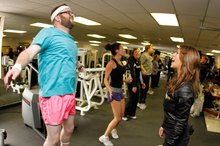What does fact checked mean?
At Healthfully, we strive to deliver objective content that is accurate and up-to-date. Our team periodically reviews articles in order to ensure content quality. The sources cited below consist of evidence from peer-reviewed journals, prominent medical organizations, academic associations, and government data.
The information contained on this site is for informational purposes only, and should not be used as a substitute for the advice of a professional health care provider. Please check with the appropriate physician regarding health questions and concerns. Although we strive to deliver accurate and up-to-date information, no guarantee to that effect is made.
How to Lose 45 Pounds in 2 Months
Weight loss is not something that can happen overnight. It is possible to lose 45 lbs. in two months, but this should be done under a doctor's care. Adhering to a strict diet and exercise program is key to losing weight and keeping it off. Making simple healthier lifestyle choices will give you the energy and strength you need to lose weight and live life to the fullest.
Exercise five days a week for 30 to 45 minutes. Try to do cardio exercises, like walking or running, in addition to lifting weights. Burning calories and building muscle mass is a winning combination to looking and feeling great.
Banking Calories Method of Weight Loss
Learn More
Replace processed foods with whole foods. Replace the junk food with fresh vegetables, fruits, whole grains and clean sources of protein like chicken or fish.
Eat a low-calorie and low-fat diet. The only way to lose weight is to burn more calories than you are consuming. When you first start eating less calories, you may feel hungry regularly. However, as you start to lose weight, your body will become more accustomed to a healthy calorie intake.
How to Lose 50 Pounds in Six Months
Learn More
Drink plenty of water. Water helps flush toxins through your body. Drinking at least eight glasses of water on a daily basis will also help move food through your system to stimulate weight loss.
Add more fiber to your diet. Fiber will help keep your bowel movements more regular, which will aid in your weight loss goals. You can add fiber to your diet by eating whole grains, vegetables and fruits. You can also add fiber supplements to your health routine if you are not getting enough fiber through food sources.
Allow yourself a cheat day. Cutting out all bad food is unrealistic for most people and can lead to bingeing. Eating a slice of pizza or having a small piece of cake once in a while will not pack on the pounds. Give into your cravings on your cheat day, but don't go crazy. Eat one portion size of the junk food you love most. Knowing that you will be able to eat the food you are craving once a week will help you maintain your willpower when making healthy eating choices on other weekdays.
Weigh yourself regularly. A study done by the Mayo Clinic showed that successful weight loss patients weighed themselves weekly or daily 1. Weighing yourself can be encouragement to keep eating healthy and exercising as you see the weight coming off 2. Weighing yourself regularly can also act as a reminder that unhealthy choices can lead to weight gain.
Related Articles
References
- Mayo Clinic: Tips to Lose Weight and Keep it Off
- Best Way to Lose Weight, Guide to Behavior Change. National Heart Lung and Blood Institute. http://www.nhlbi.nih.gov/health/educational/lose_wt/behavior.htm.
- Johnston, B.C. (2014b) ‘Weight loss among named diet programs’, JAMA, 312(9), pp. 923–933. doi: 10.1001/jama.2014.10397.
- Malik VS, Schulze MB, Hu FB. Intake of sugar-sweetened beverages and weight gain: A systematic review.The American Journal of Clinical Nutrition. 2006;84(2):274–288. http://ajcn.nutrition.org/content/84/2/274.long.
- Office of Dietary Supplements - Dietary Supplements for Weight Loss: Fact Sheet for Professionals. National Institutes of Health. https://ods.od.nih.gov/factsheets/WeightLoss-HealthProfessional/.
- Weight control. Medline Plus. https://medlineplus.gov/weightcontrol.html.
Writer Bio
Based in South Florida, Beth Swanson has been writing professionally since 2005. Her articles have been published in the magazines “Kiwi," “Natural Home,” “Clean Eating,” “Palm Beacher," the “Miami New Times” and several other publications. Swanson earned a Master of Arts degree in integrated marketing communication from the University of Colorado at Boulder.









